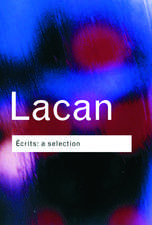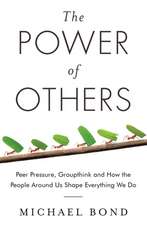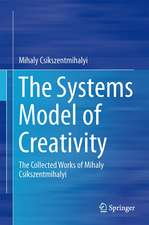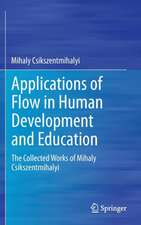Positive Nations and Communities: Collective, Qualitative and Cultural-Sensitive Processes in Positive Psychology: Cross-Cultural Advancements in Positive Psychology, cartea 6
Editat de Helena Águeda Marujo, Luis Miguel Netoen Limba Engleză Hardback – 16 aug 2013
| Toate formatele și edițiile | Preț | Express |
|---|---|---|
| Paperback (1) | 640.06 lei 6-8 săpt. | |
| SPRINGER NETHERLANDS – 27 aug 2015 | 640.06 lei 6-8 săpt. | |
| Hardback (1) | 646.30 lei 6-8 săpt. | |
| SPRINGER NETHERLANDS – 16 aug 2013 | 646.30 lei 6-8 săpt. |
Din seria Cross-Cultural Advancements in Positive Psychology
- 24%
 Preț: 593.47 lei
Preț: 593.47 lei - 18%
 Preț: 944.67 lei
Preț: 944.67 lei - 20%
 Preț: 570.72 lei
Preț: 570.72 lei - 18%
 Preț: 894.97 lei
Preț: 894.97 lei - 15%
 Preț: 648.89 lei
Preț: 648.89 lei - 24%
 Preț: 890.15 lei
Preț: 890.15 lei - 18%
 Preț: 793.63 lei
Preț: 793.63 lei - 18%
 Preț: 950.96 lei
Preț: 950.96 lei - 18%
 Preț: 947.35 lei
Preț: 947.35 lei - 18%
 Preț: 948.79 lei
Preț: 948.79 lei - 20%
 Preț: 554.97 lei
Preț: 554.97 lei - 18%
 Preț: 961.41 lei
Preț: 961.41 lei - 15%
 Preț: 643.00 lei
Preț: 643.00 lei - 18%
 Preț: 787.15 lei
Preț: 787.15 lei - 15%
 Preț: 643.34 lei
Preț: 643.34 lei - 15%
 Preț: 650.69 lei
Preț: 650.69 lei
Preț: 646.30 lei
Preț vechi: 760.35 lei
-15% Nou
Puncte Express: 969
Preț estimativ în valută:
123.67€ • 129.72$ • 102.95£
123.67€ • 129.72$ • 102.95£
Carte tipărită la comandă
Livrare economică 01-15 aprilie
Preluare comenzi: 021 569.72.76
Specificații
ISBN-13: 9789400768680
ISBN-10: 9400768680
Pagini: 288
Ilustrații: XXIV, 262 p.
Dimensiuni: 155 x 235 x 21 mm
Greutate: 0.58 kg
Ediția:2014
Editura: SPRINGER NETHERLANDS
Colecția Springer
Seria Cross-Cultural Advancements in Positive Psychology
Locul publicării:Dordrecht, Netherlands
ISBN-10: 9400768680
Pagini: 288
Ilustrații: XXIV, 262 p.
Dimensiuni: 155 x 235 x 21 mm
Greutate: 0.58 kg
Ediția:2014
Editura: SPRINGER NETHERLANDS
Colecția Springer
Seria Cross-Cultural Advancements in Positive Psychology
Locul publicării:Dordrecht, Netherlands
Public țintă
ResearchCuprins
Preface; Ruut Veenhoven.- Introduction: Towards a Participatory and Ethical Consciousness in Positive Psychology; Helena Águeda Marujo and Luis Miguel Neto.- Part I. Introductory Perspectives.- Chapter 1. Two Images: Rhizome and the Gift Exchange in Life and Service; Christopher J. Kinman.- Chapter 2. Positive Institutions, Communities, and Nations: Methods and Internationalizing Positive Psychology Concepts; Grant J. Rich.- Part II. Display of Psychological Attributes: From Personal to Social.- Chapter 3. The Altruism Spiral: An Integrated Model for a Harmonious Future; Lawrence Soosai-Nathan and Antonella Delle Fave.- Chapter 4. The Importance of Friendship in the Construction of Positive Nations; Graciela Tonon and Lía Rodriguez de la Vega.- Chapter 5. Satsang: A Culture Specific Effective Practice for Well-Being; Kamlesh Singh, Anjali Jain and Dalbir Singh.- Chapter 6. Co-curricular Activities and Student Development: How Positive Nations encourage students to pursue careers in Psychology; Mercedes A. McCormick, Grant J. Rich, Deborah Harris O'Brien and Annie Chai.- Part III. Realization: From Individual to Collective.- Chapter 7. The European Championship as a Positive Festivity: Changes in Strenghts of Character Before, During and After the Euro 2008 in Switzerland; René Proyer, Fabian Gander, Sara Wellenzohn and Willibald Ruch.- Chapter 8. Positive Psychology and Interpersonal Forgiveness within Cultures; Julio R. Neto, Robert Enright, Bruna Seibel and Silvia Koller.- Chapter 9. South Africa's Truth and Reconciliation Process as Applied Positive Psychology in Nation Building; Marié P. Wissing and Q. Michael Temane.- Part IV- Agency: From Passive to Active.- Chapter 10. Gross National Happiness: A Case Example of a Himalayan Kingdom’s Attempt to Build Positive Nations; George W. Burns.- Chapter 11. The Revolution of Happiness and the Happiness of Political Revolutions: Reflections around the Portuguese Case; Miguel Pereira Lopes,Patricia Jardim da Palma and Telmo Ferreira Alves.- Chapter 12. Positive Community Psychology and Positiv Community Development: Research and Intervention as Transformative Appreciative Actions; Luis Miguel Neto and Helena Águeda Marujo.-Chapter 13. From South West Africa to Namibia: Subjective Well-Being Twenty-one Years after Independence; S. Rothmann and Martina Perstling.
Notă biografică
Helena Águeda Marujo is professor of Management of Human Resources at Technical Lisbon University in Portugal. Her research interests ate in Positive Community Psychology, in particular how to bring positive psychology to impoverish and marginalized populations, studying processes such as post-traumatic growth, happiness, optimism and hope as mediators for the struggle for better lives. Social justice, relational goods and rhizome relations are some of the concepts underlying her argument for new methods and approaches in research. Together with Dr. Luis Neto she coined the term Transformative Appreciative Research that integrates those perspectives. She is currently an invited professor at Valladolid University in Spain, and was a visiting professor and invited Luis Miguel Neto is professor at Technical University of Lisbon, Portugal. He taught for 29 years at Faculdade de Psicologia/Psychology School of Lisbon University, where he coordinates for ten years a Open Community Service of Family Therapy. He has a EdD in family Therapy from University of Massachusetts, USA and a Master from Seville University in Spain. He is an invited teacher at Valladolid University where he gives classes on a post-graduated course on Positive Psychology and development of Sense of Humour.
Textul de pe ultima copertă
This book approaches the field of positive psychology from a post-modern perspective. It explores the consequences of combining current trends and models with supplementary participatory and transformative methods. The book brings a more collective, qualitative, culturally sensitive and transformative approach to the processes of making sense and implementing the science of positive psychology. It moves beyond the individual level towards a “knowledge community” and “knowledge of the communities”. The book is an invitation to more participatory and polyphonic dialogues in the field of positive psychology.
Caracteristici
Approaches the field of positive psychology from a post-modern perspective Challenges ideas and procedures while building upon the virtues of current models Builds on Maslow’s idea of “growth science” Includes supplementary material: sn.pub/extras





















